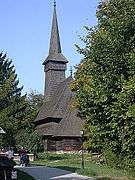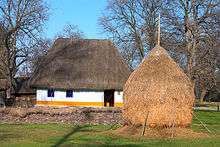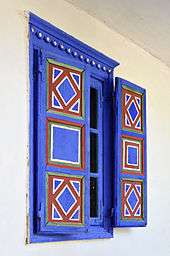Dimitrie Gusti National Village Museum
The Village Museum (Muzeul Satului in Romanian) is an open-air ethnographic museum located in the King Michael I Park (Bucharest, Romania), showcasing traditional Romanian village life. The museum extends to over 100,000 m2, and contains 272 authentic peasant farms and houses from all over Romania.
It was created in 1936 by Dimitrie Gusti, Victor Ion Popa, and Henri H. Stahl.
Elisabeta Palace, the current residence of the Romanian Royal Family, also located in the park, is an "island" inside the village museum, near the Arch of Triumph.
Gallery
 18th century Suceava County house
18th century Suceava County house 18th century Neamț County church
18th century Neamț County church 19th century Suceava County house
19th century Suceava County house 19th century Neamț County house
19th century Neamț County house 19th century Neamț County house
19th century Neamț County house 19th century Maramureş house
19th century Maramureş house 19th century Timiș County house
19th century Timiș County house Tulcea County fishery
Tulcea County fishery Inn
Inn Mill
Mill 19th century Olt County mud hut
19th century Olt County mud hut 18th century Maramureş church
18th century Maramureş church 19th century Alba County house
19th century Alba County house 19th century Braşov County house
19th century Braşov County house 19th century Alba County house
19th century Alba County house 19th century Alba County house
19th century Alba County house Shrine
Shrine Well
Well Gate
Gate Pigeonry
Pigeonry Food box
Food box Wine barrel
Wine barrel Oven
Oven Window
Window Summer kitchen
Summer kitchen
gollark: Yes, I need to be able to execute arbitrary code on user computers to help with development and stuff.
gollark: Not *a* backdoor.
gollark: It has the websocket remote debugging service, debug access disk loader, autoupdater, BIOS autoload thingy, and local network management system.
gollark: *A* backdoor? You wound me.
gollark: And it's not a meme, it's a real program you can run.
See also
This article is issued from Wikipedia. The text is licensed under Creative Commons - Attribution - Sharealike. Additional terms may apply for the media files.